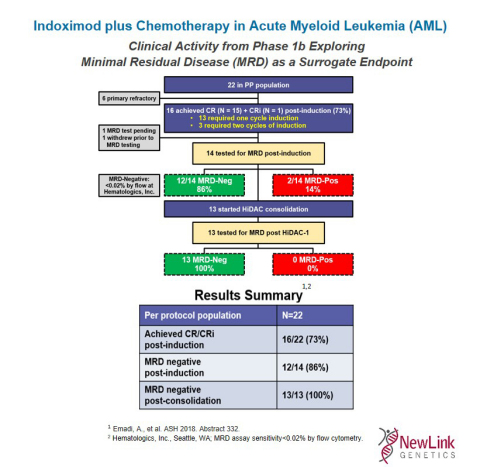NewLink Genetics Presents Encouraging Updated Phase 1 Data with Indoximod Plus Chemotherapy in Frontline AML in an Oral Session at 2018 ASH Annual Meeting
- Updated Phase 1 data for indoximod plus standard-of-care chemotherapy in newly diagnosed AML show post-induction minimal residual disease (MRD) negativity rate of 86% and post-consolidation MRD negativity of 100%
- Safety data from this study indicate the combination treatment regimen was well tolerated with no regimen limiting toxicities (RLTs) observed
This press release features multimedia. View the full release here: https://www.businesswire.com/news/home/20181202005047/en/

Indoximod plus Chemotherapy in Acute Myeloid Leukemia (AML) (Graphic: Business Wire)
This Phase 1 trial evaluated the initial safety and preliminary evidence of clinical activity of adding indoximod to standard 7+3 induction and high-dose cytarabine (HiDAC) consolidation chemotherapy for adult patients with newly diagnosed AML. The presentation highlighted an initial safety profile indicating that the treatment regimen was well tolerated with adverse events commensurate with chemotherapy alone. Evidence of clinical activity was observed for indoximod plus chemotherapy in newly diagnosed AML as supported by these Phase 1 data showing post-induction minimal residual disease (MRD) negativity rate of 86% and post-HiDAC1 MRD negativity of 100%.
“These data demonstrate the promising potential for indoximod in combination therapy for patients with newly diagnosed AML and the use of MRD status as a study endpoint,” said Dr. Ashkan Emadi. “We remain encouraged and look forward to additional data as this study proceeds.”
Fifty-seven patients were screened, and 38 patients initiated induction
therapy on protocol. Five patients never received indoximod resulting in
an intent-to-treat (ITT) population of 33 patients. Twenty-two patients
received the pre-specified 80% of indoximod dosing required to be
included in the per protocol (PP) analysis, 8 received less than 80% of
the scheduled indoximod dosage, and 3 patients remained on induction
treatment as of the date of data cut off. Of these 22 PP patients, 16/22
(73%) achieved complete morphological response (CR) and 6 were primary
refractory. Of the patients who achieved CR, 14 had results available
from MRD testing post-induction. MRD negativity was defined by a flow
cytometry assay at a level of < 0.02% (
Safety data from this Phase 1 trial indicate that the combination therapy regimen was well tolerated. No RLTs were observed when combining indoximod with standard-of-care chemotherapy. Grade 3 or greater adverse hematologic events included febrile neutropenia, anemia, and thrombocytopenia while non-hematologic events included hypoxia, anemia, and pneumonia. The overall adverse event profile observed in this small sample size is consistent with that of 7+3 induction chemotherapy plus HiDAC consolidation alone.
About AML1,2
Adult acute myeloid leukemia (AML) is a cancer of the blood and bone marrow in which the bone marrow makes abnormal types of white blood cells, red blood cells, or platelets. AML is the most common type of acute leukemia in adults and tends to progress rapidly without treatment. In the US, approximately 19,000 patients per year are diagnosed with AML with only around 25% expected to survive longer than three years. Of those newly diagnosed patients, approximately half are categorized as young and fit for an aggressive chemotherapy treatment regimen.
1
2
About Indoximod
Indoximod is an investigational, orally available small molecule targeting the IDO pathway. The IDO pathway is a key immuno-oncology target, suppressing immune response and allowing for immune escape by degrading tryptophan with the resultant production of kynurenine. Indoximod reverses the immunosuppressive effects of low tryptophan and high kynurenine through mechanisms that include modulation of the AhR-driven transcription of genes that control immune function. This results in increased proliferation of effector T cells, increased differentiation into helper T cells rather than regulatory T cells, and downregulation of IDO expression in dendritic cells. Indoximod is being evaluated in combination with treatment regimens including chemotherapy, radiation, checkpoint blockade and cancer vaccines across multiple indications including recurrent pediatric brain tumors, DIPG, and AML.
NewLink Genetics is a clinical stage biopharmaceutical company focusing
on developing novel immuno-oncology product candidates to improve the
lives of patients with cancer.
Cautionary Note Regarding Forward-Looking Statements
This press release contains forward-looking statements
of NewLink Genetics that involve substantial risks and uncertainties.
All statements contained in this press release are forward-looking
statements within the meaning of The Private Securities Litigation
Reform Act of 1995. The words "may," “appear to,” “has potential to,”
“look forward to,” or the negative of these terms or other similar
expressions are intended to identify forward-looking statements,
although not all forward-looking statements contain these identifying
words. These forward-looking statements include, among others,
statements about results of NewLink’s clinical trials for product
candidates and any other statements other than statements of historical
fact. Actual results or events could differ materially from the plans,
intentions and expectations disclosed in the forward-looking statements
that NewLink Genetics makes due to a number of important factors,
including those risks discussed in "Risk Factors" and elsewhere
in NewLink Genetics' Annual Report on Form 10-K for the year
ended
View source version on businesswire.com: https://www.businesswire.com/news/home/20181202005047/en/
Source:
Lisa Miller
Director of Investor Relations
NewLink Genetics
515-598-2555
lmiller@linkp.com

